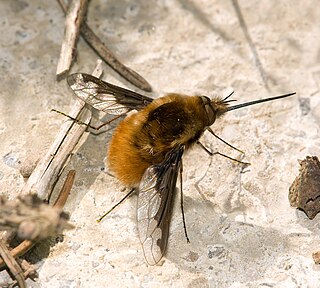
The Bombyliidae are a family of flies. Their common name are bee flies or humbleflies. Adults generally feed on nectar and pollen, some being important pollinators. Larvae generally are parasitoids of other insects.
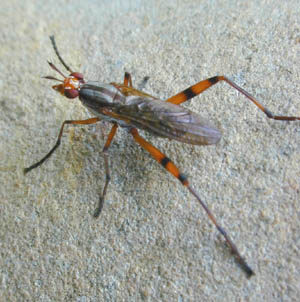
The Acalyptratae or Acalyptrata are a subsection of the Schizophora, which are a section of the order Diptera, the "true flies". In various contexts the Acalyptratae also are referred to informally as the acalyptrate muscoids, or acalyptrates, as opposed to the Calyptratae. All forms of the name refer to the lack of calypters in the members of this subsection of flies. An alternative name, Acalypterae is current, though in minority usage. It was first used by Pierre-Justin-Marie Macquart in 1835 for a section of his tribe Muscides; he used it to refer to all acalyptrates plus scathophagids and phorids, but excluding Conopidae.

Argyra is a genus of flies in the family Dolichopodidae. The name "Argyra" comes from the Greek word for "silver".
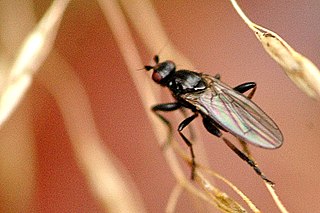
Sphaeroceridae are a family of true flies in the order Diptera, often called small dung flies, lesser dung flies or lesser corpse flies due to their saprophagous habits. They belong to the typical fly suborder Brachycera as can be seen by their short antennae, and more precisely they are members of the section Schizophora. There are over 1,300 species and about 125 genera accepted as valid today, but new taxa are still being described.
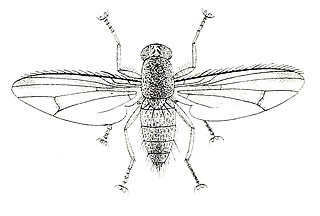
The Curtotonidae or quasimodo flies are a small family of small grey to dark brown humpbacked flies (Diptera) with a worldwide distribution, but with very few species in the Nearctic, Australasian/Oceanian, and Palaearctic regions. Most members of the family are found in tropical to subtropical latitudes in Africa and the Neotropics. Many remain undescribed in collections, since little work on the family has been done since the 1930s.

Odiniidae is a small family of flies. There are only 58 described species but there are representatives in all the major biogeographic realms.

Diastatidae are a family of flies, and are in the order Diptera. They occur primarily in the Holarctic Region, but several species are known from the Oriental, Neotropical, and Australasian regions. Members of the family number over 20 described species in three genera. There is an additional fossil genus.

Hybotidae, the typical dance flies, are a family of true flies. They belong to the superfamily Empidoidea and were formerly included in the Empididae as a subfamily.

The Pyrgotidae are an unusual family of flies (Diptera), one of only two families of Cyclorrhapha that lack ocelli. Most species are "picture-winged", as is typical among the Tephritoidea, but unlike other tephritoids, they are endoparasitoids; the females pursue scarab beetles in flight, laying an egg on the beetle's back under the elytra where the beetle cannot reach it. The egg hatches and the fly larva enters the body cavity of the beetle, feeding and eventually killing the host before pupating. In the United States, some species of Pyrgota and Sphecomyiella can be quite common in areas where their host beetles are abundant. Like their host beetles, these flies are primarily nocturnal, and are often attracted to artificial lights.

The Richardiidae are a family of Diptera in the superfamily Tephritoidea.
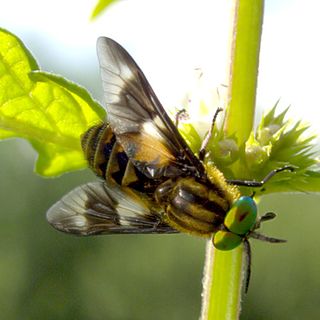
Superfamily Tabanoidea are insects in the order Diptera.
Aulacigastridae is a very small family of flies known as sap flies. The family Stenomicridae used to be included within this family, but was moved by Papp in 1984. They are found in all the Ecoregions.

Cordyligaster is a genus of bristle flies in the family Tachinidae.

The Helosciomyzidae are a small family of flies - 9 genera and 22 species. All are known from the Southern Hemisphere. With the exception of the South American genus Sciogriphoneura, the family occurs in Australia, New Zealand. Little is known of their biology.

The Helcomyzidae are a small family of flies in the Acalyptratae. The larvae feed on kelp and other organic matter washed up on shorelines. Species diversity is highest in New Zealand and south temperate South America. They are sometimes allied with the families Dryomyzidae or Coelopidae.

Ocydromiinae is a subfamily of hybotid flies.

Palpada is a genus of 85 neotropical and nearctic flower flies or hoverflies
Euthychaeta is a genus of flies in the Diastatidae family.
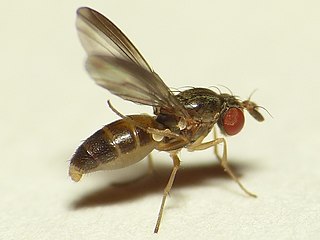
Campichoeta are a genus of flies, and are in the family Diastatidae.
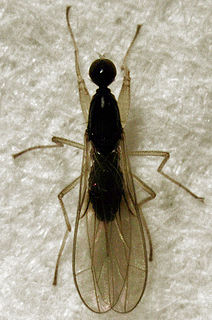
Hemerodromiinae are a worldwide group of predatory flies with raptorial forelegs.


















